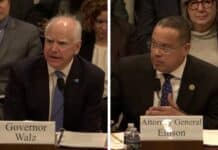Minneapolis allowed voters to turn in their ballots using a “drive-through option” ahead of Tuesday’s primary, the first state election amid the coronavirus pandemic.
“Keeping people in their vehicles or on their bikes not only makes returning ballots faster and more convenient, it also helps people maintain a good physical distance during the COVID-19 pandemic,” said a city press release.
Between Friday and 3 p.m. Tuesday, drive-through ballot drop-offs were set up outside the Minneapolis Elections and Voter Services building and in the skyway outside the Hennepin County Government Center.
Under a recent court ruling, absentee ballots will be counted as long as they are postmarked on or before the day of the primary and received in the mail no later than two days after the primary. Ballots cannot be dropped off at polling locations on the day of the primary.
Minneapolis Elections and Voter Services said it received 630 ballots on the first day of its drive-through drop-off.
First day of ballot drive-thru drop off… DONE ✅
630 ballots received! 🎉
The drop off will be open again 9a-4p tomorrow (Saturday) and 8a-5p on Monday at 980 E. Hennepin Ave. Get those ballots back in, Minneapolis! pic.twitter.com/GRPfWRVgKx
— Minneapolis Elections & Voter Services (@VoteMpls) August 7, 2020
In Washington County, officials said they would not be accepting ballots left in drop-boxes outside county offices.
The idea of ballot drop-boxes was included in a “Defending Democracy” plan released by DFL lawmakers in April. That proposal also called for allowing “individuals and community organizations to assist voters complete, then collect and deliver, sealed ballots,” a practice referred to as ballot harvesting, which is illegal in Minnesota.
The Minnesota Voters Alliance, an election-integrity group, has sued several municipalities, including Minneapolis and Ramsey County, for their failure to comply with a law requiring absentee ballot boards to have both Democratic and Republican members.
The lawsuits allege that several Minnesota cities and counties simply appoint government staff “to accept and reject ballots behind closed doors without any citizen election judge oversight or party balance.”










